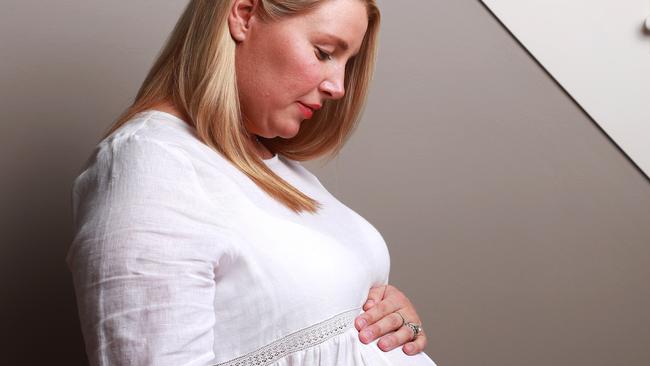Coronavirus: doctors hope corona baby may offer antibody clues
Sally Hawach’s blood and that of her unborn baby could help scientists better understand how the body fights COVID-19.

Sally Hawach’s pregnancy has become a source of deep intrigue among Australia’s medical establishment after infectious disease experts indicated her blood and that of her unborn baby could help scientists better understand how the body fights COVID-19.
“I’ve become a lab rat”, Ms Hawach, 35, told The Weekend Australian. “I’m offering my blood, my umbilical cord, and my daughter’s blood — anything to help other people.”
Ms Hawach and her husband, Pierre, were among 39 guests infected with COVID-19 at a wedding at Stanwell Tops on the NSW south coast on March 6.
The couple, from Pennant Hills in Sydney’s northwest, and their one-year-old daughter, Mirabel, received a clean bill of health from doctors in early April after the trio recovered from COVID-19. Their two-year-old son, Lewis, wasn’t infected by the virus.
Ms Hawach, however, is 36 weeks’ pregnant with her third child, and unlike many other soon-to-be-mums, she and her doctors are wrestling with a great unknown: what, if anything, does COVID-19 do to an unborn baby?
“Everyone has assured me that the baby is quite protected,” she said. “But right after that, I’m then told ‘look, we don’t know what could happen because we’ve never seen this virus before’.”
Ms Hawach is believed to be the first woman in Australia to give birth after being infected with, and recovering from, COVID-19, and she is scheduled to give birth via caesarean section this month.
“I guess I am a guinea pig,” Ms Hawach said. “I have never spoken to this many doctors in my life, and there could be a lot to learn from the baby if antibodies have developed.”
Doctors will examine the Hawachs’ baby after birth to ascertain whether the infant has been infected, either by taking samples from the nose or throat or by searching for antibodies to COVID-19 in the baby’s blood.
“There’s still no good evidence on what the antibodies mean yet,” explained Melbourne obstetrician Jenny Dowd. “We don’t know if they will be protective because there are so few cases. We are still searching for answers.”
Fortunately, so far the risks for pregnant women infected with coronavirus seem no greater than for anyone else, but the research is thin. A study published in March by the American Medical Association has offered more reassurance. Of 33 babies born at the Wuhan Children’s Hospital, only three had any signs of the virus, and even their symptoms were mild, the researchers reported.
Ms Hawach, meanwhile, experienced all of the typical hallmarks of COVID-19: fatigue, fever, cough and shortness of breath. But she also developed a host of other, stranger symptoms: dizziness, a loss of taste, and a disappearing sense of smell.
“I learned a long time ago never to be surprised when it comes to new viruses,” said Marion Kainer, head of infectious diseases at Western Health in Victoria.
“An acute loss of smell or taste is something we don’t usually see in respiratory viruses, but we’ve noticed that it’s a fairly early symptom for a number of patients we have diagnosed with COVID-19.”



To join the conversation, please log in. Don't have an account? Register
Join the conversation, you are commenting as Logout